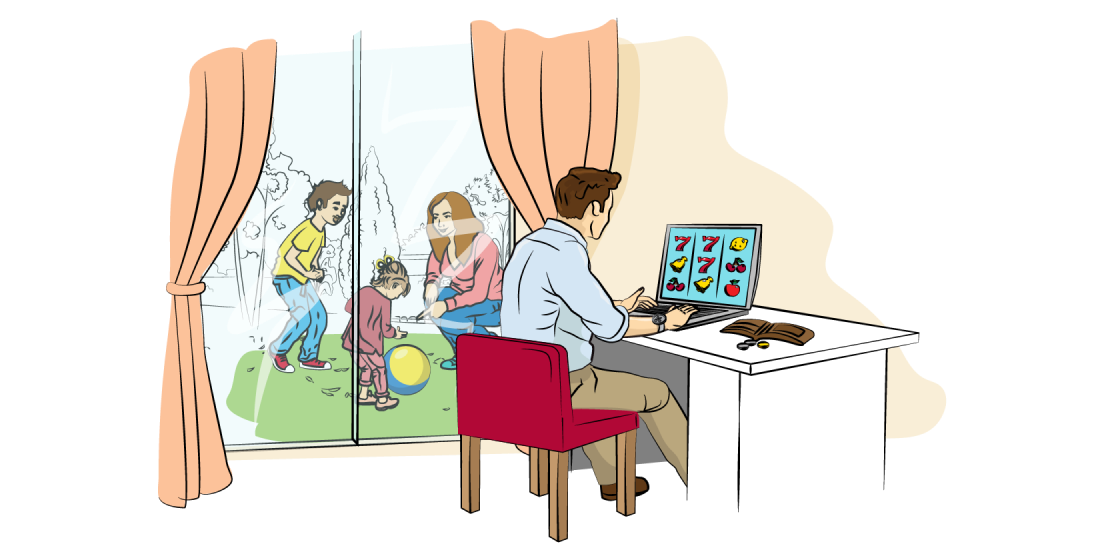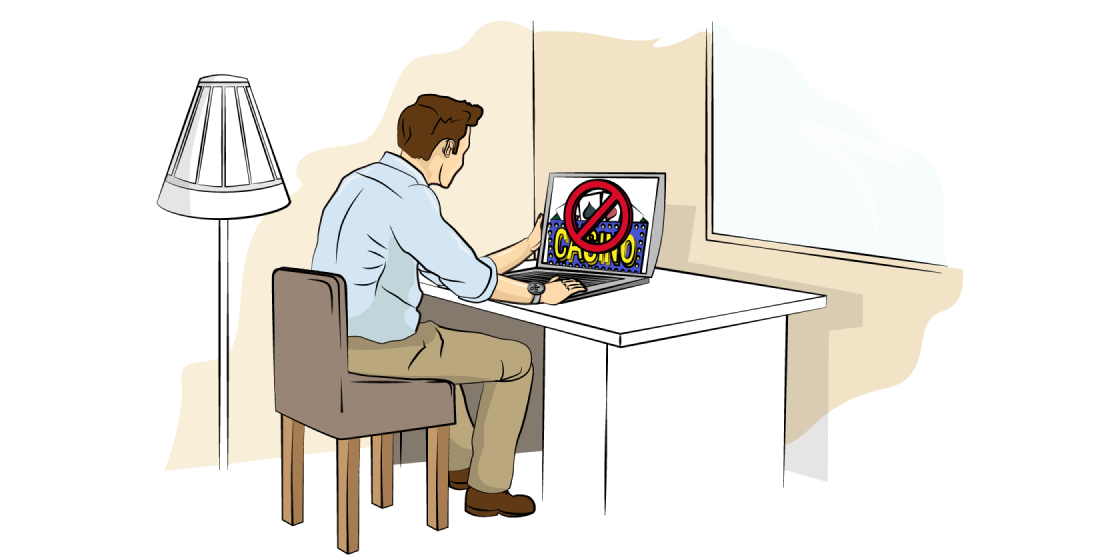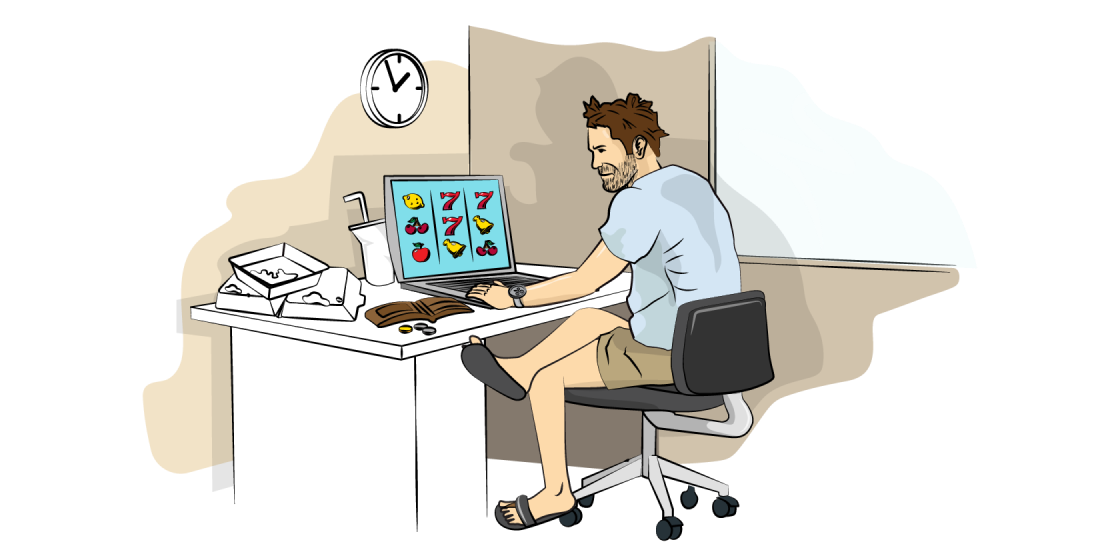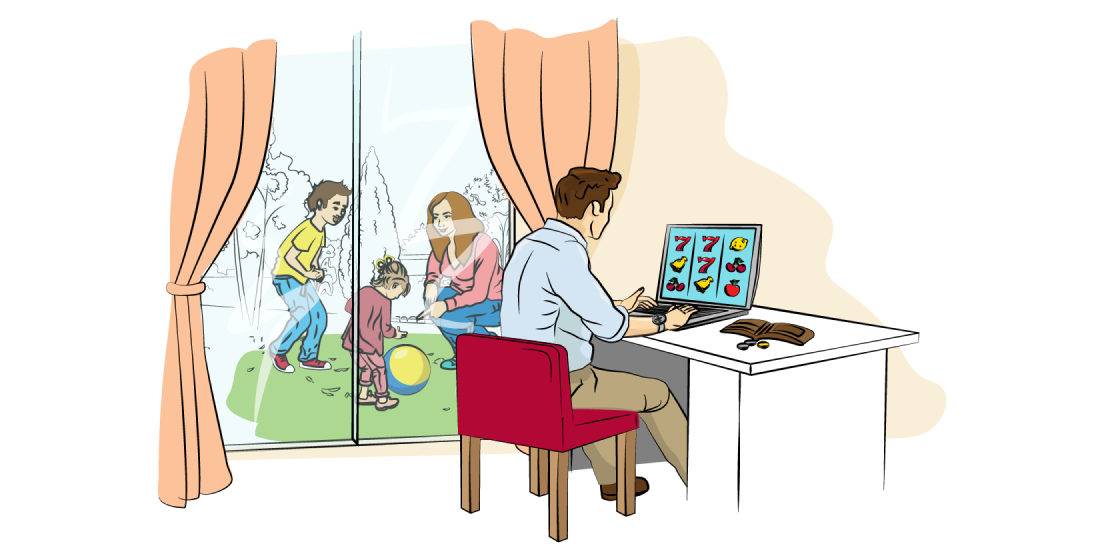Problem Gambling Symptoms and Diagnosis
It is known by many different names. Problem gambling, ludomania, gambling disorder, pathological gambling, compulsive gambling, gambling addiction. While exact definitions may vary depending on the person who you ask, the "core" definition remains the same. Gambling is considered problematic when a person has the urge to continue gambling in spite of harmful and negative consequences, or the desire to stop.
Gambling may seem like a harmless activity to you, but when it develops into something that has a negative impact on your life, its negative consequences can be devastating. This is why it’s important to examine your gambling habits if you feel like something could be wrong, and take appropriate action.
If you feel like your gambling habits (or the gambling habits of someone close to you) have become a problem, and want to learn more about the issue, this article can provide you with answers.
Contents of this article:
- What is problem gambling?
- Stages of problem gambling
- Signs of problem gambling
- Problem gambling diagnosis
- What to do about it
Definition of problem gambling
We have already mentioned the basic definition of problem gambling in the first paragraph of the article. Problem gambling is the urge to gamble continuously in spite of its harmful or negative consequences, or the inability to stop gambling even when you know you should. Problem gamblers keep on playing even though their gambling habits negatively affect them (or the people around them), and even when they wish to stop.
Problem gambling is not necessarily about how much you gamble, or the size of your bets, but the consequences of gambling-related actions on your life, the lives of your family, friends and the people around you. It’s fair to say that the likelihood of developing a harmful gambling habit is higher for people who gamble on a regular basis and wager larger amounts of money, however.
How the definition has developed over time
Although the term "gambling addiction" has been in frequent use for quite some time, the entire issue of problem gambling was not classified as an addiction until very recently. The American Psychiatric Association, in addition to people from most other organizations, have classified pathological gambling as an impulse control disorder for many years. This might be one of the reasons why the term "compulsive gambling" is still regularly used today.
The American Psychiatric Association published the fifth edition of their Diagnostic and Statistical Manual of Mental Disorders (DSM-5) in 2013, which is where and when problem gambling started to be professionally referred to as an addictive disorder or addiction. This is a really fitting description due to gambling addiction having many similarities with substance addiction, despite falling into a different category of behavioral addiction.
Gambling addiction and most cases of substance addiction seek to activate the brain’s reward mechanisms, which is not the case for impulse control disorders.
How problem gambling develops and changes over time
The diagnosis of being a problem gambler is not static. Symptoms tend to evolve and change over time, often in a cyclical manner. To better illustrate the changing nature of problem gambling, we have decided to include two "models" of problem gambling that will help you understand what a problem gambler generally goes through.
This could be helpful in understanding your own condition in you struggle with gambling, and if somebody you know has this problem, it could help you to empathize with them and help them get back on the right track.
The three stages of problem gambling
Let’s start with the three stages of problem (or compulsive) gambling as described by Robert L. Custer, M.D., in his chart of compulsive gambling and recovery. This chart also contains three stages of recovery, but here we’ll focus on problem gambling for the purposes of this article. You can find the three stages of recovery in our article on overcoming problem gambling.
1. The winning stage
Problem gambling doesn’t always start by losing money, but by winning it. The initial big (or even small) win that a person experiences through gambling can cause them to become even more interested and intrigued by it. This is what often develops into a gambling problem, or even fully fledged addiction.
Frequent gambling often ensues after the first winning experiences, combined with fantasies about further wins. A person can get excited about gambling, enjoy winning, and slowly become more and more obsessed with it.
During the winning stage, gambling is not generally considered to be a problem by gamblers themselves, nor by the people around them. Gambling is viewed as a form of entertainment, and most commonly occurs as a group activity.
2. The losing stage
As mentioned over and over again on Casino Guru, it is not possible to keep winning money at online casinos over the long-term. It therefore makes sense that the winning phase eventually comes to an end. And that’s where the losing stage begins.
During the losing stage, a player may experience prolonged gambling episodes, start to gamble alone, and become even more preoccupied with gambling. But because they are now losing money instead of winning it (and not even breaking even), gambling starts to become problematic.
Gambling starts to turn into a problem, not only because of the money lost, but also due to changes in personality, absences from work, a careless attitude, and so on. We will mention more symptoms of problem gambling further on in this article, with many of them manifesting themselves in the losing phase.
Money becomes a significant problem, too. It is difficult to "fuel" a problematic gambling habit over the long-term, so people at the losing stage will often start to borrow money or look for alternative ways to get more money to gamble with (both legally and illegally). Debts start to pile up and becomes increasingly difficult to pay back.
3. The desperation stage
The desperation stage comes next. Preoccupations with gambling increase even more, and many people turn to illegal activities at this stage to obtain further money. Feelings of remorse and panic are pretty common, as players realize what they have done and how difficult it could be to get back to their normal life.
Reputations can become negatively affected, as other people start to notice these problematic gambling habits, with work and social life suffering as well. Due to the difficulty of taking responsibility for what has already happened, it is quite common to blame other people for the misfortunes experienced through problem gambling.
After the desperation stage, gamblers basically hit the bottom. This state is characterized by hopelessness and withdrawal symptoms if a person doesn’t have enough money to keep on gambling. Alcohol and drug abuse are relatively common in this situation, and so is finding illegal ways to get money, in addition to getting arrested as a result of these actions. This is where most emotional breakdowns and suicidal thoughts occur.
The problem gambling cycle
The three stages of problem gambling are fitting in many aspects but they are mostly linear, which means that a person moves from one stage to another while getting increasingly closer to the bottom. Problem gambling often changes in a cyclical fashion, which is why we have also decided to include the GamCare problem gambling cycle in this article.
This cycle contains five "states":
- Trigger – A trigger is something that causes a person to think about playing again after a "gambling-free" period. This trigger can be internal, such as an emotion that causes someone to resort to gambling, or external, such as walking by a bar with a slot machine in it. What is important to realize is that triggers can change over time, and each gambling episode can be triggered by something different.
- Urge – After experiencing the trigger, a physical or emotional urge to gamble starts developing. It gets increasingly hard to resist, and sooner or later a person starts gambling again.
- Gambling episode – What follows can only be described as a gambling episode, which can involve both winning and losing.
- Further gambling – After the initial gambling episode, it is common to keep on gambling, either to chase after losses (in losing episode scenarios) or to try to win even more (in winning episode scenarios).
- Gambling stops – Gambling eventually comes to a stop. This is most commonly caused by one of two factors – either time runs out, or money does. Whichever comes first.
Due to being part of the cycle, it is possible to go from the fifth state back to the first one. This is very common. If a person suffers from problem gambling, it is only a matter of time until another trigger comes along and stimulates the urge to play, which turns into another gambling episode. And so on. The only way to get out of this vicious cycle is to explore ways of overcoming problem gambling, and get help.
Symptoms and signs of problem gambling
Gambling is considered to be a problem when players can’t stop playing even though it is having a negative impact on their lives, or they feel the need to stop. Among other factors, the aforementioned negative consequences can be viewed as signs and symptoms of problem gambling.
Gambling disorder influences pretty much all aspects of an individual’s life, so the symptoms can be very diverse. This is why we have decided to separate them into the categories listed below. Click any of the links below and you will be taken to a section of this article which describes the listed symptoms in more detail.
- Wanting to stop gambling and feeling remorse after playing
- Money-related symptoms
- Losing a substantial amount of money because of gambling
- The desire to win a lot of money (for a multitude of reasons, ranging from selfish incentives, to needing money to take care of other people)
- Playing until everything has been lost
- Trying to win back previously lost money
- The need to increase bet sizes in order to achieve the same thrill from gambling
- The need to borrow money to gamble
- Not wanting to spend money on anything else, so that it can be used for gambling
- Committing crimes in order to finance gambling
- Time-related symptoms
- Gambling takes up an ever increasing amount of time
- Playing for longer than expected or planned
- Not having enough time for other activities, friends, family or work because of gambling
- Work-related symptoms
- Missing work because of gambling
- Decreased efficiency and concentration at work
- Loss of ambitions and goals
- Social symptoms
- Deteriorating relationships
- Losing touch with other people
- Destroyed reputation
- Lying about gambling
- Psychological and biological symptoms
- Fear
- Irritability
- Inability to sleep
- Self-destructive and suicidal thoughts
- Carelessness
- The use of gambling as an escape
- Depression
- Anxiety
Let’s now take a look at these symptoms in more detail so that you can better understand how they manifest themselves in all aspects of life.
Note: If you don’t want to read about these symptoms in detail, you can use the following link to skip to the part of this article that describes multiple ways to find out if your gambling habits have become problematic.
Wanting to stop gambling, and feeling remorse after playing
Problem gamblers often (but definitely not always) feel like their gambling habits have a negative impact on their lives, but this feeling is not always enough to stop them from gambling. In such situations, addiction is much stronger than the desire to stop, which is why this is one of the most important symptoms of problem gambling, and why it was mentioned separately in the above definition.
This is connected to another sign of problem gambling, which is the feeling of remorse after gambling. You might have experienced this yourself. After gambling for some time, and ultimately losing money, you realize that it’s wrong and makes you feel unhappy. And returning to something which is ultimately making a person unhappy is a clear sign of addiction, or at least problematic gambling habits.
Money-related symptoms
One of the many symptoms of gambling addiction is losing a lot of money. This is quite obvious, even to people who have never gambled in their lives. Money-related issues connected to problem gambling go much deeper, however.
The desire to win money is often present during the early development stages of gambling addiction. Some people dream about a huge win that could change their lives, while others only want to take care of themselves and their families, and view gambling as a way to achieve this. This way of thinking is highly problematic, however, and should be avoided at all costs.
As you may already know if you have read some of our other articles, casino games (and other forms of gambling) are set up to favor the casino. You are always at a disadvantage, and cannot win over the long-term. You could earn a decent one-off win, which often acts as a "hook" to keep you at the table in the hope of getting lucky again.
But the opposite is true, more often than not. Problem gamblers often play until they lose everything they can possibly lose. They try to win back their lost money, only to dig a deeper hole for themselves. And it gets harder and harder to "escape" as this goes on.
The lives of problem gamblers and their families can suffer before they lose everything. They don’t want to spend money on other essentials such as food and housing, for example, in order to have more money for gambling.
Money tends to disappear from a problematic gambler’s pocket at an ever increasing pace. One of the signs of problematic gambling is the need to increase bet sizes to achieve the same thrill as before. If you don’t enjoy making the same bet sizes as you did before, this could indicate that something is wrong.
Once problem gamblers lose everything at their disposal, they may start looking for other ways to get money for their gambling habits. They start borrowing money from family, friends or from financial institutions and, in the most serious instances, commit crimes to get money to play.
Time-related symptoms
Another aspect of life that might suffer from problematic gambling habits, is time. As gambling addiction develops, it starts taking up more and more time, which eventually eats into other daily activities. If gambling takes up a growing amount of your time, this can be considered one of the symptoms of an unhealthy relationship with it.
Another sign of problem gambling is playing for longer than expected. You might have told yourself that you will only spend a certain amount of time in an online or brick-and-mortar casino, but when the predetermined timeframe ends, it can be difficult to stop playing.
By spending more and more time in a casino, or by getting involved with other forms of gambling, you may not have enough time for activities you once enjoyed, including family, friends or even work. A problem gambler can find themselves doing nothing more than gambling, sleeping and eating. And even sleeping can suffer.
Gambling addicts may find themselves completely preoccupied with gambling, thinking about it for large portions of the day, and looking for more time (and money) to play. Gambling becomes a form of celebration, but also a way to escape from personal issues, which we will talk about in more detail later on.
Work-related symptoms
Regardless of whether a problem gambler is an employee, self-employed or a business owner, their work tends to suffer because of gambling. As already mentioned, if you start spending more and more time gambling, you might not have sufficient time to devote to your work.
A business owner or self-employed person’s enterprise may start to suffer, while employees could start missing work, cause work-related issues, or even get fired.
A problem gambler’s career or business doesn’t necessarily suffer just because of lack of time. Gambling addiction can also result in loss of efficiency. As your mind becomes preoccupied with gambling, it gets increasingly difficult to concentrate on anything else. Your work can suffer even if are devoting the same amount of time to it as before.
Lastly, an unhealthy relationship with gambling can result in the loss of your ambitions and goals. You stop caring about goals and achievements, and work seems pointless and undeserving of your time.
Social symptoms
Social life and relationships also suffer because of problem gambling. As gambling addiction develops, individuals become more and more preoccupied with gambling, and lose touch with family, friends, partners and coworkers.
This leads to deteriorating relationships, which are sometimes repairable over time, but there might not be any way back if it goes too far. It is important to remember that once trust is broken, it is very difficult to get it back. This is why problem gambling has destroyed so many relationships over the years, and will keep doing so in the future. The only thing you can do is to try to stop before it’s too late.
Another thing that can be severely damaged by gambling-related problems is a person’s reputation. If word spreads about your problematic gambling habits, it has the potential to become a major social and work-related issue, due to the negative view most people have about gambling.
People with a gambling addiction are also prone to lying about their gambling habits, both to themselves and to other people (family, friends, coworkers, etc.). Being worried about how your gambling habit might be perceived by others is pretty common, such as not wanting other people to do something about it, and by cutting off a source of money used for gambling, for example.
Psychological and biological symptoms
Gambling addiction is a behavioral addiction, which often means that most of its symptoms and signs are related to a person’s mental health. That can be said about most of the symptoms we have listed above, but there are other psychological signs of problem gambling that we will list in this specific article.
One thing that you might feel in relation to gambling, is fear. Of course, this negative emotion is not present at all times. You might feel excitement while gambling, but as soon as the money runs out and you realize what has happened, fear often follows. Fear is a very strong emotion which is why it is so dangerous, and can cause you to do irrational things.
Fear can also make you irritable when reacting to things that make you feel scared. Irritability is not only caused by fear. Gambling often becomes a touchy subject, and you might react irritably whenever somebody wants to talk about it. This is not good for your recovery, as talking about your issues is often very helpful in overcoming them.
It is also difficult to get a good night’s sleep when battling gambling addiction. The mind is preoccupied with gambling and all of its effects, and it might be difficult to fall asleep or stay asleep for the entire night. Restlessness, inability to relax, and lack of sleep only make the situation worse.
Problematic gambling habits can make a person act self-destructively, especially when they hit the bottom, lose their money and possessions, or ruin their relationships with family and friends. This is when suicidal thoughts occur quite regularly, and when the most harm can be done.
Whenever you feel strong negative emotions, or experience the symptoms mentioned above, it is only natural to look for an escape. Unfortunately, people with problematic gambling habits often use gambling as a way to escape these problems, which only makes the situation worse and harder to overcome.
Due to the difficulty of finding an "escape", you might become careless, lose interest in things, and not really care about what happens to you. Coupled with the aforementioned self-destructive and suicidal thoughts, this could be a recipe for disaster. This is why it is important to take steps towards recovery as soon as you suspect something is wrong, to avoid getting into such a situation.
But psychological symptoms of problem gambling don’t stop there. Depression and anxiety are pretty common too. This mix of various psychological (and other) symptoms becomes very dangerous, which is why you should take action as soon as you suspect something is be wrong.
Problem gambling diagnosis: How to tell whether you are affected or not
Let’s take a look at the steps you can take to discover whether your gambling habits are problematic. Gambling can also be enjoyed as a harmless form of entertainment, but as soon as it becomes more than just a "fun activity", it’s important to stop playing and seek help if needed.
In this section of the article we list a number of "problem gambling diagnoses" to help you figure out whether your gambling habits are safe, or problematic. Specifically, we'll cover:
Gamblers Anonymous questionnaire
Gamblers Anonymous is one of the biggest organizations that deal with problem gambling in the world. The common goal of this fellowship it to help people with gambling-related problems, through the organization of dozens of support groups around the world, and other forms of help from people who have experienced the same issues.
To help answer the question of whether a person is a problem gambler or not, Gamblers Anonymous uses a questionnaire with 20 ‘yes or no’ questions:
- Did you ever lose time from work or school due to gambling?
- Has gambling ever made your home life unhappy?
- Did gambling affect your reputation?
- Have you ever felt remorse after gambling?
- Did you ever gamble to get money with which to pay debts or otherwise solve financial difficulties?
- Did gambling cause a decrease in your ambition or efficiency?
- After losing did you feel you must return as soon as possible and win back your losses?
- After a win did you have a strong urge to return and win more?
- Did you often gamble until all your money was gone?
- Did you ever borrow to finance your gambling?
- Have you ever sold anything to finance gambling?
- Were you reluctant to use "gambling money" for normal expenditures?
- Did gambling make you careless of the welfare of yourself or your family?
- Did you ever gamble longer than you had planned?
- Have you ever gambled to escape worry, trouble, boredom, loneliness, grief or loss?
- Have you ever committed, or considered committing, an illegal act to finance gambling?
- Did gambling cause you to have difficulty in sleeping?
- Do arguments, disappointments or frustrations create within you an urge to gamble?
- Did you ever have an urge to celebrate any good fortune by a few hours of gambling?
- Have you ever considered self-destruction or suicide as a result of your gambling?
This questionnaire, with clickable answers, is available at the Gamblers Anonymous website, together with other extremely helpful resources about gambling-related problems. To summarize, Gamblers Anonymous claim that compulsive (problem) gamblers answer ‘yes’ to about 7 or more of the 20 questions. These questions can serve an unofficial form of problem gambling diagnosis, although they should not be used as a substitute for an official diagnosis provided by a trained professional.
DSM-5 diagnosis
In terms of official diagnoses, the most widely used method of determining whether an individual suffers from gambling addiction (or problem gambling) is described in the aforementioned fifth edition of Diagnostic and Statistical Manual of Mental Disorders (DSM-5).
DSM-5 uses the following criteria to diagnose gambling disorders:
- Persistent and recurrent problematic gambling behavior leading to clinically significant impairment or distress, as indicated by the individual exhibiting four (or more) of the following in a 12-month period:
- Needs to gamble with increasing amounts of money in order to achieve the desired excitement.
- Is restless or irritable when attempting to cut down or stop gambling.
- Has made repeated unsuccessful efforts to control, cut back, or stop gambling.
- Is often preoccupied with gambling (e.g., having persistent thoughts of reliving past gambling experiences, handicapping or planning the next venture, thinking of ways to get money with which to gamble).
- Often gambles when feeling distressed (e.g., helpless, guilty, anxious, depressed).
- After losing money gambling, often returns another day to get even ("chasing" one’s losses).
- Lies to conceal the extent of involvement with gambling.
- Has jeopardized or lost a significant relationship, job, or educational or career opportunity because of gambling.
- Relies on others to provide money to relieve desperate financial situations caused by gambling.
- The gambling behavior is not better explained by a manic episode.
If you feel like at least four of these criteria apply to you, your gambling habits are considered problematic according to DSM-5. The Diagnostic and Statistical Manual of Mental Disorders specifies three levels of severity:
- Mild: four to five criteria met
- Moderate: six to seven criteria met
- Severe: eight to nine criteria met
DSM-5 also differentiates between episodic and persistent cases of gambling disorder:
- Episodic: Meets a level of diagnostic criteria at more than one point in time, involving symptoms that subside between periods of gambling disorder for at least several months.
- Persistent: Experiences continuous symptoms, and meets diagnostic criteria for multiple years.
Gambling disorder can go into remission according to DSM-5, with the following two cases being specified in the manual:
- Early remission: After the full criteria for gambling disorder have been met, none of the criteria for gambling disorder have been met for at least three months, but for less than 12 months.
- Sustained remission: After full criteria for gambling disorder have been met, none of the criteria for gambling disorder have been met during a period of 12 months, or longer.
Other diagnostic tools
There are numerous other tools designed to help players assess their gambling habits and find out whether they should look for help, or if it isn’t necessary. Each of them has a slightly different approach, but the principle is the same. They rely on asking questions about multiple symptoms of problem gambling, and assess the level of "danger" that an individual might be in.
If you want to try them out for yourself, please use the links listed below:
- Gambling Therapy self-assessment questions
- GamCare self-assessment tool
- GambleAware self-assessment tool
What to do if you have a gambling problem
When you realize you might have a problematic gambling habit, multiple things can be done about it. There are many ways to overcome or treat gambling addiction, ranging from self-help methods through help lines, support groups, or even in-patient rehab clinics.
The most suitable method of overcoming problem gambling depends on your specific situation and the seriousness of your unhealthy gambling habits, but the most important thing is to take action whenever you feel like gambling is getting out of hand. The worst thing you can do is nothing, and wait for things to get worse.
Even if you exhibit only some of the symptoms listed in this article, it is definitely better to be safe than sorry when facing a fearsome enemy like problem gambling. You can read more about the multiple things you can do in our article about overcoming problem gambling and how to treat it.


















